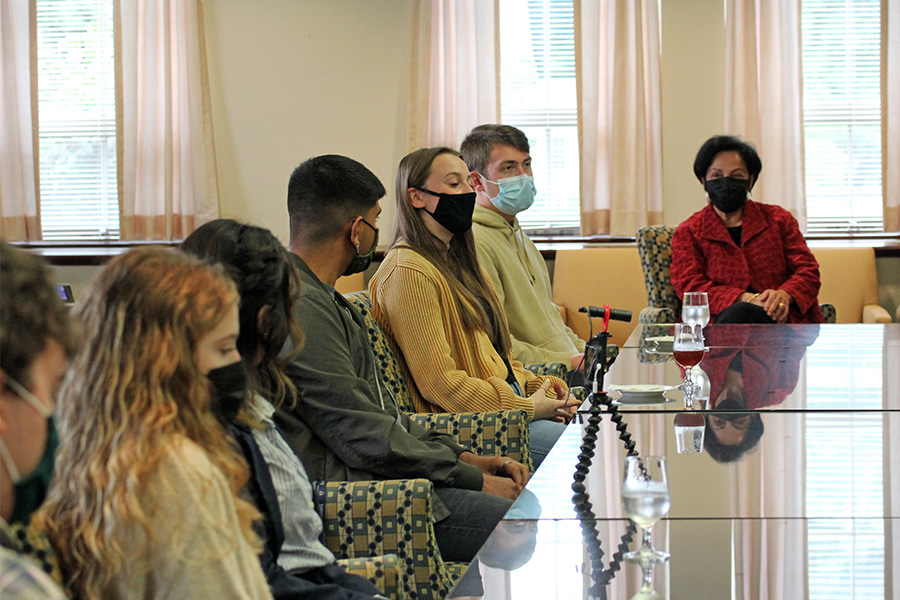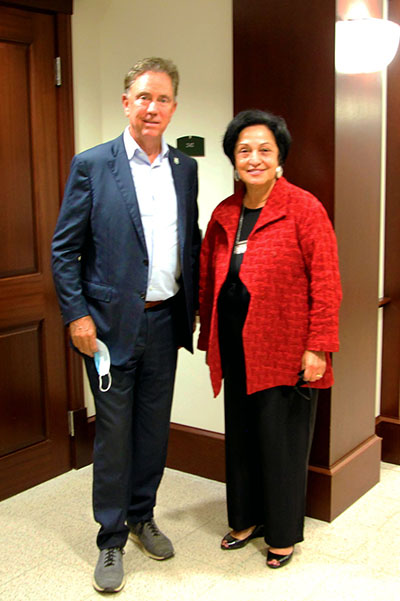- Apply
- Visit
- Request Info
- Give
Lamont talks with students on loans, pandemic, marijuana
Written by Dwight Bachman
Published on October 12, 2021

Since the mid-’60s, spurred by the war in Viet Nam and the Civil Rights Movement, college campuses have been the center of political discourse and social action. Today in 2021, campuses are no different, with a recent national survey finding that more than half of undergraduate students support social justice issues.
On Oct. 5, Connecticut Governor Ned Lamont visited the Eastern Connecticut State University campus to hear student concerns on a variety of issues. Approximately 25 students met with Governor Lamont for an informal question and answer session. Financial aid topped the list of student issues, but other topics were also addressed.
“He provided informative answers to many of the questions posed to him,” said Matt Duval ’23, a history and secondary education major from Haddam. Duval is a member of the University’s Honors Program and treasurer for the Honors Club. “I felt the governor provided a wide sweeping portrayal of many of the current issues and the steps our state government is taking to handle these issues.” Duval also said he is looking forward to hearing more about the State of Connecticut’s plans to end the current masking mandate due to COVD-19. 
Sara DiVasto ’24, of Trumbull, is double majoring in elementary education and biology. She serves as vice president of Eastern’s Aspiring Educators; public relations officer of the Book Club; secretary of Nutmeg Hall; is a member of Outdoors Club; and is an Eastern tour guide. DiVasto believes off-campus issues such as homelessness and poverty should be a priority for the governor, as these issues affect numerous people. “There are many who are unable to afford college and I liked Governor Lamont’s perspective that everyone should have access to education. The topics of financial aid and student retention/involvement cover many concerns. I think that with improved affordability students would stay in college longer.”

Jarod Werner ’23, a junior political science major and history minor, is from Vernon. Werner was interested in another off-campus issue — the recent legalization of recreational marijuana in Connecticut. “I expressed my support for it, due to the horrible impact the ‘war on drugs’ has had on individuals and communities across the country. I was interested to hear the governor mention the economic benefits he saw legalized marijuana bringing to the state.”
McKenna Lerch ’24 is an elementary education and liberal studies double major with a concentration in history and social sciences from Vernon. She works in the Advising Center, is secretary for the Education Club and is a peer mentor. Lerch’s concerns focused on the cost of a college education. “It’s extremely difficult to manage college payments when my family has been negatively impacted by COVID. It would be wonderful if (Governor Lamont) could help students with loans and overwhelming debt. It is stressful with the amount of credits and hours spent put into assignments, papers and tests. Worrying about being able to stay in college can be too much at times.”
Katherine Platt ’24, a computer science major from Enfield, is involved in the Student Government Association, Residential Housing Association, Student Athlete Association Committee and LEAP leadership program, as well as a member of the rugby and track teams. Vaccinations are her major concern and she said she is looking forward to further developments as the state works to achieve full vaccination status in Connecticut. “I would also like to know the steps the governor plans to take to slowly drop any mask or social distancing guidelines.”


